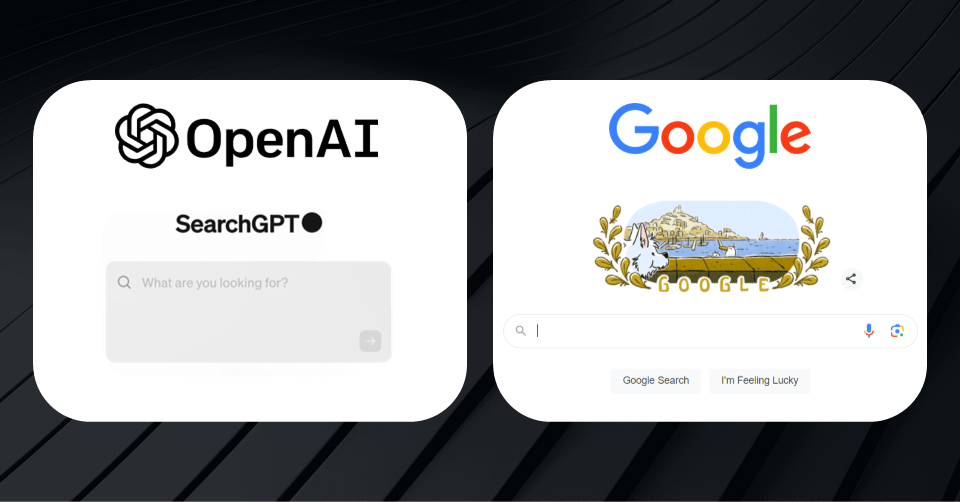The digital marketing community is abuzz with a provocative statement: “SEO is dead.”
With the emergence of AI-driven search, many believe we are witnessing the end of traditional find and click practices. But, as with all transformative technologies, it’s rarely that simple. Rather than sounding a death knell for search, AI is evolving how we find information, how we interact with digital platforms, and, crucially, how businesses are discovered by potential customers.
To understand what’s really happening, consider a few key facts about today’s search environment (shared by Jake Ward of Contact Studios):
- Searches grow by around 10% every year
- Google processes 8.5 billion searches each day
- SEO remains a $100 billion industry
While search might be transforming, it’s far from disappearing. And for businesses, this evolution represents a massive opportunity. Let’s take a closer look at what’s changing, why it matters, and how to navigate this new landscape.
How AI Is reshaping user expectations
For years, search engine optimisation has been fundamental to digital strategy, with marketers honing techniques to connect search queries with relevant content. But AI is reshaping the entire search journey, fundamentally altering user expectations. Today’s digital audience, accustomed to instant solutions, expects seamless and personalised experiences, and generative AI is meeting that demand.
AI tools like OpenAI’s ChatGPT, Google’s AI Overview, and Perplexity are changing how users interact with the search process, presenting them with answers that feel personalised, comprehensive, and immediate. This shift from traditional, link-based search results to AI-driven conversation challenges the very concept of what it means to “rank” or to be “discovered” online.
In place of search engines showing a list of possible answers, AI platforms are delivering a single, cohesive response to user questions. The implications for businesses are profound:
- Direct answers supersede links: In AI-based search, users often receive an answer to their query without needing to click on a website. The result? Fewer site visits, fewer page views, and lower click-through rates—traditional SEO metrics that once gauged success.
- Personalisation and authority: Because users are given a single response, the focus shifts from keyword optimisation to establishing authority. Content must directly and expertly address user questions to have a chance of appearing in these AI-generated responses.
- User behaviour evolution: Users are no longer sifting through a list of options; they’re trusting AI to deliver the “right” answer. This paradigm shift moves us away from the user-controlled experience of exploring various sources toward a guided experience, where the AI determines the information they receive.
Take Perplexity, for example – as CEO Aravind Srinivas describes in his TED video ‘Is Google’s reign over?’ – their "answer engine," reflects this shift in user expectations. Unlike traditional search engines focused on links, Perplexity aims to deliver direct, source-cited answers, emphasizing accuracy and transparency. This approach could redefine how businesses engage audiences, moving from clicks to trust-based content that prioritizes clear, authoritative answers over mere link generation.
So what do these changes mean to legacy SEO techniques? And how can you get your content served in AI chatbots responses?
AI summaries and the rise of content efficiency
Google’s featured snippets, which aim to give users answers directly in the search result, pioneered this shift toward concise, content-rich summaries. Today, AI-generated summaries take this idea further, offering comprehensive answers that pull information from multiple sources and package it in a way that feels immediate and complete.
For businesses, this model presents both challenges and opportunities. The challenge lies in reduced visibility: fewer users are clicking through to their website. And for many, a drop in traffic means fewer leads! The opportunity, however, is for brands that can position themselves as authorities. When done right, content that provides high-quality, concise and specific answers can secure a place in these AI summaries, establishing brand authority in the process. But the rules on how to achieve this are unclear.
In the SEO era, Google offered some degree of transparency, giving businesses guidelines on how to improve content to rank better in search results. But the AI-driven search algorithms we see today operate largely within a black box. This opacity creates challenges on two fronts: understanding how AI ranks content and determining how biases might shape which information is prioritised.
The question remains: does brand authority balance out the fact the reader may not visit your website, doesn’t get in the destinations funnel, etc? Is the brand visibility enough? The answer to this lies somewhere in the original intent of inbound content marketing. Which is to attract customers by creating valuable content and experiences that are tailored to them. However, without a direct visit, brands may lose the deeper engagement that drives lasting relationships—like retargeting, data capture, and nurturing opportunities. While brand authority in AI snippets builds passive recognition, true inbound impact relies on creative strategies to prompt direct user interaction and sustained connection beyond the initial answer.
Optimising in the dark
AI-driven search platforms have yet to publish clear guidelines on how content should be structured or optimised to rank well in AI-generated answers. Without transparency, companies are left to guess which content will resonate with AI algorithms, making it difficult to form a reliable strategy.
Imagine trying to compete in an Olympic event where you don’t know the scoring criteria. You’re left without a playbook, trying different tactics and hoping for a good result. That’s essentially what businesses face today with AI-driven search.
The dangers of passive search
In their 2024 paper “Envisioning Information Access Systems: What Makes for Good Tools and a Healthy Web?” Chirag Shah and Emily Bender (University of Washington) highlight a key concern with AI-driven search: the risk of eroding user trust and transparency. As LLMs like ChatGPT provide polished but sometimes unverifiable answers, users may be more inclined to accept these outputs at face value. We’re losing some of the human curation we’re used to and the quality control associated with it.
As Bender and Shah emphasise, user agency and source diversity are vital for meaningful information access. In traditional search, users compare multiple sources, refining their understanding. In contrast, LLMs may encourage passive consumption, potentially reducing the critical engagement that fuels information literacy. This shift underscores the need for content that not only ranks well but fosters active, informed engagement.
Potential biases and the influence of content partnerships
Then there is the question of bias – we don’t know the rules for interpreting the content in the LLM training data. Do the LLM owners even know? If AI is trained primarily on sources that lean toward a particular viewpoint, does that lead to bias in how it ranks or prioritises information? We’ve already seen Google Gemini’s problems with race. This lack of transparency around biases has raised concerns across industries, particularly for businesses striving to deliver balanced perspectives.
Moreover, some companies are already taking steps to enter exclusive partnerships with AI platforms, negotiating deals that allow their content to be prioritised within AI search results. This trend could give rise to a “pay-to-play” model, where businesses with the resources to negotiate exclusive access enjoy enhanced visibility, potentially crowding out smaller players. Is this a business model of the future? After all, selling ad space in its search results was a major contributor in making Google what it is today.
In this environment, businesses that value visibility need to consider ethical implications, balancing partnerships with an emphasis on fairness and accessibility in their content strategy.
Voice search and the impact on digital discovery
AI-driven search isn’t just changing what users see; it’s also changing how they interact with information. One of the most transformative developments in recent years has been the rise of voice search. With tools like ChatGPT now incorporating voice recognition and response capabilities, users are moving from text-based queries to spoken, conversational interactions.
Voice search changes the nature of search queries themselves. Rather than typing a few keywords, users are asking full questions, often conversationally. For example, a user might ask, “What’s the best way to improve remote team productivity?” rather than typing “remote team productivity tips.”
This shift demands a change in SEO strategy, moving from keyword-focused optimisation to prioritising long-tail, conversational keywords that match natural language.
To succeed in this area, companies need to create content that directly answers common questions in a clear and approachable tone. Structured data can play a key role here as well, helping AI-driven voice search tools understand and prioritise specific answers within a webpage.
When users receive information through voice search, they aren’t skimming—they’re listening. This means that answers need to be brief, relevant, and engaging, capturing attention immediately. For companies, this represents an opportunity to refine messaging, making it not only SEO-friendly but also “voice search–friendly.” Considerations like tone, brevity, and relevance take on added importance when information is delivered audibly rather than visually.
The overwhelming surge of AI-generated content
As AI becomes more accessible, content creation is easier and cheaper than ever before. The internet is flooded with more material, but not all of it is high-quality or even useful. This “content explosion” brings new challenges for companies that aim to stand out.
For C-level executives, this new landscape demands a commitment to quality over quantity. When every competitor can generate dozens of articles at low cost, businesses need to distinguish themselves through relevance, authority, and depth. Content that lacks substance, originality, or credibility is unlikely to cut through the noise.
The solution isn’t to compete in sheer volume but to invest in creating content that resonates. Businesses that focus on producing meaningful, well-researched content are more likely to build trust and establish authority, even as AI-generated content floods the market.
In a world where AI is generating generic content at scale, thought leadership stands out as a powerful differentiator. When executives and experts within a company share insights that are genuinely useful and thought-provoking, it positions the brand as a leader in its field. Content that offers a unique perspective or actionable advice has a better chance of making an impact—especially when it’s aligned with a larger content strategy.
AI search still needs content
We still need content. And that content needs to be found and indexed. So, the underlying principles remain true;
- Focus on topic authority: AI algorithms appear to prioritise content that demonstrates expertise and authority. For businesses, this means creating in-depth resources that tackle topics comprehensively.
- Use structured data: Structured data can make it easier for AI algorithms to identify relevant information on a webpage, potentially improving its chances of appearing in AI summaries.
Search success requires understanding and addressing the specific queries that AI chatbots are likely to prioritise—and that requires a comprehensive content strategy focused on authority, relevance, and quality.
These methods offer no guarantees, but they provide a starting point for companies looking to establish a presence in AI-driven search environments.
Practical steps for executives in an AI-driven search world
The impact of AI on search is complex, but businesses that take proactive steps to adapt can still thrive. Here are some key actions for C-level executives navigating the evolving world of AI-powered search:
- Invest in content that demonstrates authority: To build a brand that stands out in AI-driven search, invest in expert-driven content that offers depth and authority. This might mean working closely with internal subject matter experts or commissioning in-depth research pieces.
- Advocate for transparency in AI algorithms: Visibility depends on fairness. Businesses should advocate for clearer guidelines from AI platforms to create a level playing field for companies of all sizes.
- Adapt for voice and conversational AI: Optimise content to suit voice-based queries and conversational search, paying special attention to question-based keywords and concise, structured answers.
- Monitor AI advancements actively: AI technology is advancing rapidly, and executives need to stay informed about the latest changes to search algorithms, new functionalities, and emerging industry standards.
- Emphasise quality over quantity in content strategy: In a saturated content environment, quality will define visibility and authority. Ensure that every piece of content aligns with strategic goals and is meticulously crafted to offer true value.
Leading the charge in AI-transformed search
The digital landscape is shifting at unprecedented speed, with AI transforming the world of search and discovery. (Developments in this space are moving so quickly that this blog will need constant review and revision to keep pace!)
The old rules of SEO are evolving, but the core principles of authority, relevance, and user experience remain essential. For companies willing to adapt and innovate, AI-powered search presents a unique opportunity to redefine digital visibility and establish leadership in a new era.
By embracing these changes, advocating for transparency, and investing in high-quality content, forward-thinking executives can ensure their businesses don’t just survive but thrive in this transformed search environment. The future of search isn’t just about visibility—it’s about authenticity, authority, and adaptability. Those who lead with insight, depth, and a commitment to excellence will navigate these uncharted waters successfully.
In the end, AI isn’t killing search. It’s reshaping it, creating a richer, more complex landscape where the businesses that succeed are those that dare to lead the transformation.
We can help you get the most from AI
We combine AI and human creativity to deliver B2B marketing that elevates customer experiences to new heights.



